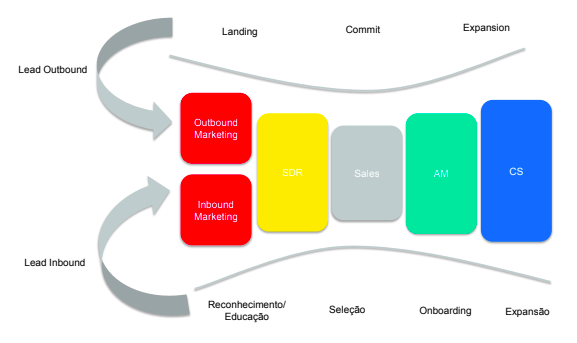By now, we all know that any customer goes through several stages before making a purchase. Traditionally, we describe these stages in a sales funnel. But if the purchase goes through several stages, the relationship with the customer has to follow this process to provide a good experience.
Therefore, an Inbound Marketing and Inside Sales operation ideally has 3 distinct roles. A Marketing specialist generates leads, in the first part of the funnel; a Sales Development Representative qualifies leads during the engagement phase; and an Account Executive closes sales.
As the company evolves or tries to take bigger steps, it is crucial to expand the sales structure and recruit for all necessary functions, to provide a better customer experience and become competitive.
Therefore, today we are going to see in detail what is expected of each role, and the characteristics that candidates must have to be a good addition to your Inbound Marketing and Inside Sales team.
Attraction
At the beginning of the sales funnel, Marketing promotes paid media and owned media initiatives to attract the target’s attention. The content specially designed to attract the right person can generate visits to a variety of channels managed by the company. These visits are the first phase of lead generation.
The responsibility for generating leads falls to Inbound and Outbound Marketing specialists. An excellent marketer is adept at designing personas based on the information they get from Sales and the quantitative data they capture from analytics tools. By getting to know the persona well, you know their preferred channels and pain points. And so all the ingredients for a successful inbound and outbound marketing plan come together.
What to look for in Inbound and Outbound Marketing:
- Ability to analyze data and gain insights
- Ability to organize and manage projects
- Knowledge and appreciation of automation
- Deep understanding of the customer experience
- UX
- knowledge Advanced knowledge of social networks
- Strategic thinking
Recognition /Education
O The purpose of this phase is to generate leads from the visits collected earlier. Marketing continues to operate at this stage, as it creates the contents and mechanisms that capture the visitor’s contact information, transforming it into a lead.
At this point, the Sales Development Representative (SDR) comes into play. It is usually a junior position, whose primary function is to contact leads, usually by phone, to qualify them.
To fulfill this prospecting phase, they employ qualification criteria corresponding to the Ideal Customer Profile and forward the best opportunities to sales. They are the first human contact between the company and the potential customer, so they need to know the range of products “back to front”.
What to look for in a Sales Development Representative: A
- Natural communicator, which includes not only speech but also active listening
- Coachability (permeable to mentoring)
- Curiosity, love of learning, and ability to acquire new knowledge
- Organization and excellent time management
- Empathy and ability to build relationships
- Ability to adapt to the interlocutor
Selection
In the selection phase, the lead becomes a sales opportunity. He has already consumed several contents and resources, he feels capable of making a decision and is ready to negotiate. However, you are likely comparing your service or product with competitors.
So it’s time to let the Account Executive step in. This is the professional charge of negotiating, making the proposal, and closing the sale. It is no longer time to educate; the objective now is to help potential clients make the best decision for themselves. Despite having results in his sights, he is an expert at building relationships, not just “closing deals”.
Characteristics you should look for in an Account Executive:
- Great written and verbal communication skills
- An assertive and confident attitude
- Ability to organize, plan and manage time
- Results-oriented
- Highly self
- Enthusiasm, perseverance, and resilience
- Knowledge of CRM tools
- Knowledge of sales techniques
- Emotional intelligence
- Sales
Onboarding
The moment immediately after the purchase is a source of a lot of excitement. The customer wants to quickly confirm that they have made the right choice and see the return on their investment. The company seeks to facilitate implementation and adoption and deliver on its promised value proposition.
Customer Success Managers (CSM) are the professionals responsible for managing this process, but their role does not end with onboarding. They are also responsible for technical support. The ultimate goal of this role is to reduce churn (cancellations) and extend Customer Lifetime Value.
- Creativity and ability to solve problems
- Relationship management and proactivity
- Deep technical knowledge about the product/service, which may require other technical skills
- Empathy and active listening
- Management of expectations
- Crisis management
- Excellent communication
- Ease of working in a team
- Excellent interpersonal
- Ability to work effectively under stress and time pressure
Expansion
Currently, the sales funnel is not complete without the expansion phase. This is the phase in which the company can obtain even more returns from the customer. By guaranteeing satisfaction through Customer Success, it becomes substantially easier to promote new business opportunities with the customer and to upsell a higher-value solution or cross-sell to another company solution.
Account Managers (AM) manage the relationship with the customer outside the technical scope, which belongs to the CSM. In this sense, they are responsible for maximizing the Customer’s Lifetime Value, which includes obtaining referrals to other potential customers and ensuring the continuity of the commercial relationship. They are also known as “farmers” because they “plow the land” to extract the maximum benefit.
- Empathy, understanding, and practicing active listening
- Excellent project management skills
- Excellent communication, written and oral
- Work well in a team, but also independently
- Leadership and responsibility
- skills Analytical thinking
- Excellent interpersonal
- skills Expectation management
- Ability to work well under stress
Hiring for the sales team is not an easy task! But if you segment sales roles around the customer journey, it’s much simpler to assemble a team that is much more than the sum of its parts.

 Português
Português Português
Português

